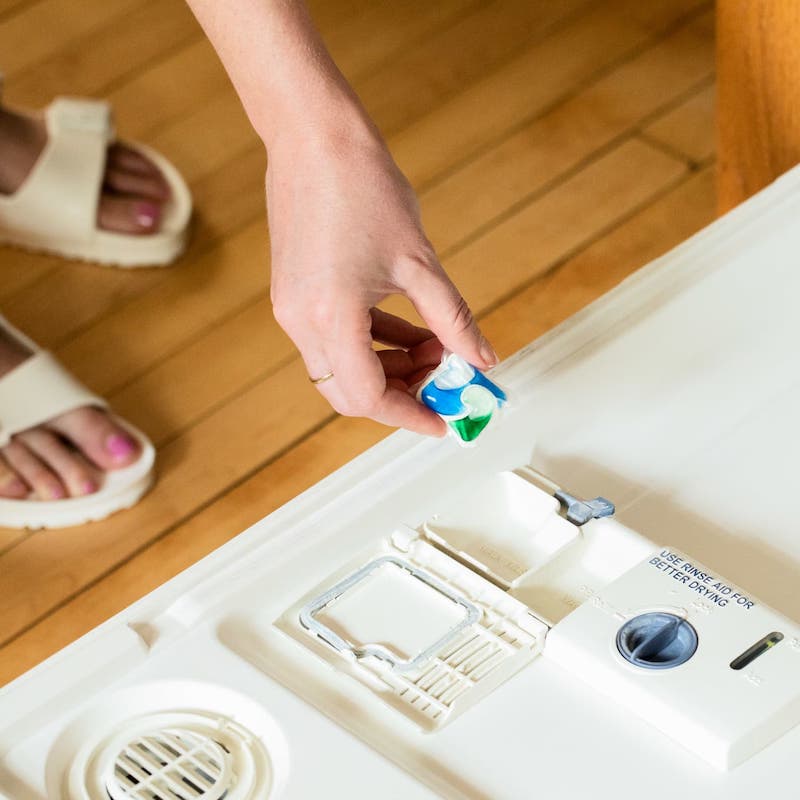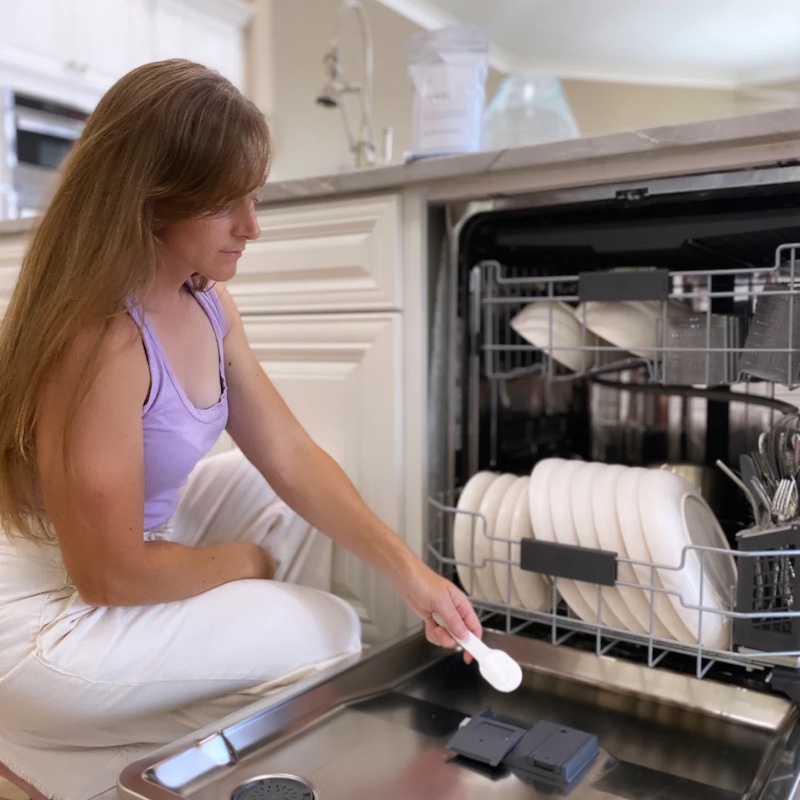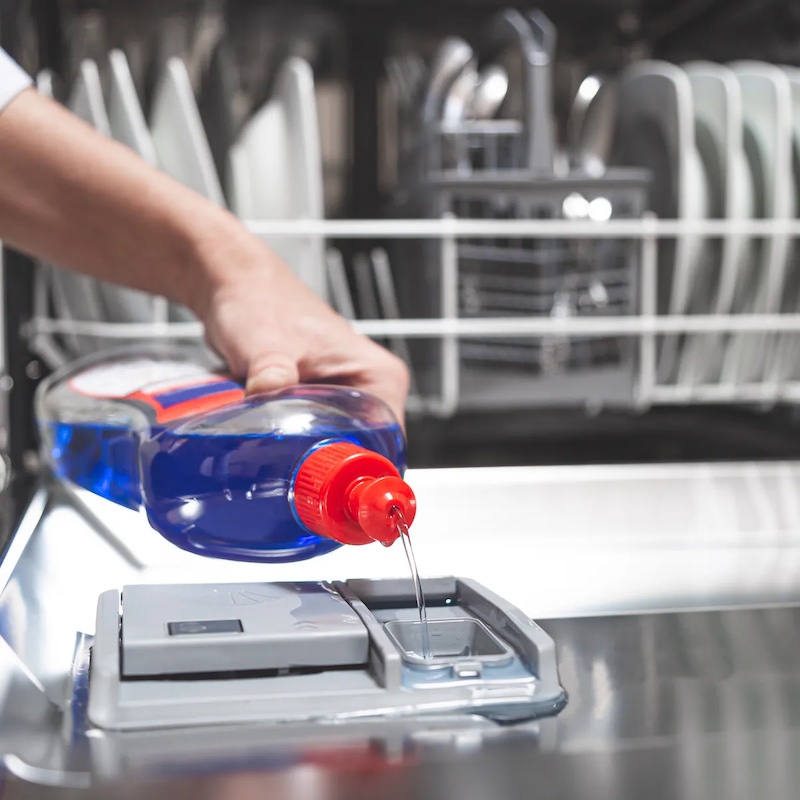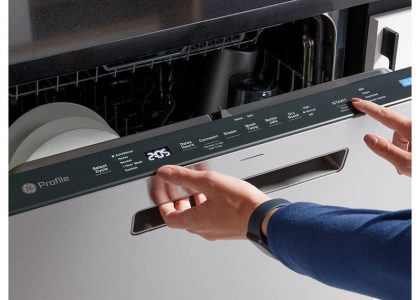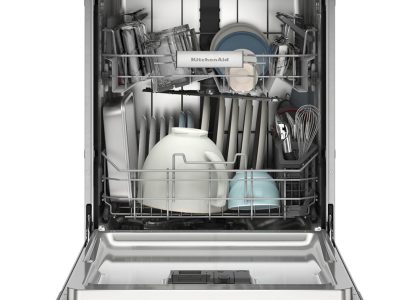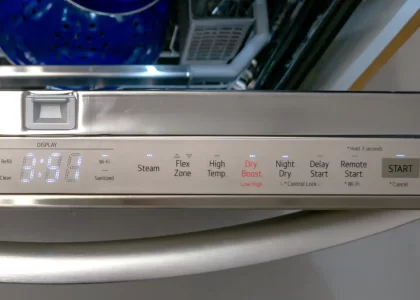Introduction to Dishwasher Detergent Types
How much dishwasher detergent to use? Choosing the right dishwasher detergent is vital for spotless dishes. Different types have their own benefits and drawbacks. Let’s explore them.
Overview of Tablets, Liquid, and Powder Detergents
Tablets: These are pre-measured, convenient, and reduce waste but can be more expensive. They work well for removing tough stains and leaving dishes with a shiny finish.
Liquid Detergents: These are versatile and can be easier to measure for small loads. They are generally less expensive but might struggle with tougher stains.
Powder Detergents: Powder is cost-effective and works best for heavy loads. It can be messy and difficult to measure, but it’s great for hard water areas.
Each type has its specific uses and effectiveness depending on your washing requirements and dishwasher model. It’s important to choose the detergent that aligns with your household needs and environmental considerations.
How to Use Dishwasher Tablets
To get dishes clean, it’s important to use dishwasher tablets correctly.
Proper Placement and Dosage Tips
Place tablets in the detergent compartment, not the silverware basket or dishwasher floor. Use one tablet per wash cycle, unless the manufacturer’s guide suggests otherwise. For smaller loads, half a tablet may suffice. Ensure the tablet compartment is dry before loading the detergent to prevent premature dissolving.
Benefits and Drawbacks of Using Tablets
Benefits:
- Convenient: Simply place a tablet in the compartment; no measuring needed.
- Efficient: Tablets are formulated to tackle tough stains.
- Safe: They reduce the risk of spilling and are safe for septic systems.
Drawbacks:
- Cost: Tablets can be more expensive per wash than liquid or powder.
- Fragility: Handle with care to avoid breaking.
- Variety: Fewer options may be available compared to liquids or powders.
Choosing the right dishwasher detergent involves looking at our needs, the price, and how we use our dishwasher. Tablets are just one choice to consider for clean, sparkling dishes.
Utilizing Liquid Dishwasher Detergent
For a swift and effortless cleaning process, liquid dishwasher detergent stands out. Its simplicity is attractive for fast-paced lifestyles.
Easy Steps for Application
Pour the detergent into the machine’s compartment until it reaches the marked line. Avoid overfilling to prevent waste and possible spills. Always check the dishwasher’s manual for the exact location and detergent amount. After adding, close the compartment and start the cycle as usual.
Pros and Cons of Liquid Detergent
Pros:
- Simple to pour: No guesswork in measuring the amount.
- Affordable: Generally costs less than tablets.
- Variety: Many scents and formulations are available.
Cons:
- Can be messy: Spills are a risk if not careful.
- Storage: Takes up more room than tablets.
- Stains: Might not handle tough residue as well as other forms.
When choosing detergent, think about these points. Liquid detergent can be a practical pick for many. But compare its features with other types to find your best fit.
The Role of Powder Dishwasher Detergent
Powder dishwasher detergent offers an economical and effective cleaning option. It’s especially suitable for larger loads and areas with hard water. Understanding how to use powder can lead to better dish washing results.
Effective Usage of Powder
For the best performance, measure powder detergent with the scoop provided. Add it to the detergent compartment, not overfilling it. Consider the dishwasher’s specific requirements as indicated in the manual. For hard water, a little extra may be needed.
Using powder needs care to avoid making a mess. Make sure the scoop is level before adding it to the machine. Start the dishwasher cycle as you would typically do. Remember to clean any excess powder from the dispenser area.
Comparing Advantages and Limitations
Advantages:
- Cost-friendly: Powder detergent is less pricey than tablets and liquids.
- Good storage: It’s easy to store away neatly without taking much space.
- Versatile: Ideal for pre-soaking badly soiled dishes in the sink before a cycle.
Limitations:
- Mess potential: Spills can happen if not careful when measuring.
- Tough on stains: May not always work as well as others on hard-to-remove residues.
- Precise measuring: Requires accurate measurement for optimal cleaning results.
Selecting a detergent type should be based on your specific needs in terms of cost, effectiveness, and convenience. Powder detergents deserve consideration for those looking for a budget-friendly and versatile option.
Determining the Right Amount of Detergent
Knowing how much dishwasher detergent to use can be tricky. Too little may leave dishes dirty, while too much can cause a soapy mess. Finding the right balance ensures clean dishes every cycle.
Factors Influencing Detergent Dosage
Several factors dictate the correct amount of dishwasher detergent:
- Water hardness: More detergent is needed in hard water to prevent spots.
- Dish load: Full loads often require more detergent, while smaller loads need less.
- Dirtiness of dishes: Heavily soiled dishes may need a stronger dose.
- Detergent type: Liquid, tablets, and powders differ in their concentration.
It’s essential to consider these factors to avoid wasting detergent and ensure spotless results.
Tips for Measuring Detergent Based on Dishwasher Type
Match detergent dosage to your dishwasher’s guidelines:
- For standard dishwashers: Follow the indicated line in the detergent compartment.
- For high-efficiency models: Use a smaller amount, as they are designed to be more effective.
- For manual dosing: If unsure, start with less and adjust based on cleanliness.
Checking the manufacturer’s instructions can lead to optimal use of detergent. Accurate dosing combined with proper maintenance can extend the life of your dishwasher and improve its performance.
Enhancing Dishwasher Efficiency
To boost dishwasher efficiency, optimizing detergent use is essential.
Best Practices for Detergent Use
- Correct Detergent Type: Choose the detergent best suited for your water type and dish load.
- Accurate Measurement: Measure detergent precisely to avoid under or over-using.
- Temperature Settings: Use hot water settings, which improve detergent efficiency and dissolve food residues better.
- Proper Loading: Arrange dishes to avoid blocking water and detergent flows. This ensures all dishes get cleaned evenly.
Maintenance Tips to Maximize Dishwasher Performance
Maintaining your dishwasher is as crucial as using the right amount of detergent.
- Regular Cleaning: Clean the dishwasher filters and spray arms regularly.
- Inspect Detergent Dispenser: Check for clogs and clean to ensure smooth detergent release.
- Door Seals Maintenance: Wipe door seals often to prevent leaks and maintain optimal performance.
- Check for Wear: Replace any worn out parts like racks or wheels to keep the dishwasher running smoothly.
By following these tips, you can increase dishwasher effectiveness and ensure cleaner dishes every cycle.
Conclusion
How much dishwasher detergent to use? To maintain a clean and hygienic kitchen, selecting the right dishwasher detergent is essential. With various options like tablets, liquid, and powder, each homeowner can find a suitable fit for their cleaning needs. Making an informed choice involves weighing costs, ease of use, and cleaning efficiency.
Summary of Detergent Types and Usage Guidelines
Tablets: Offer convenience and powerful cleaning, ideal for tough stains but may come with a higher price tag.
Liquid Detergent: A budget-friendly choice that’s easy to pour and measure. However, it may not be as strong on difficult stains compared to other forms.
Powder Detergent: Best suited for large loads and hard water areas, powder detergent is an economical option, though it can be messy and require precise measuring.
Remember, the amount of detergent used depends on water hardness, the dirtiness of dishes, and the load size. It’s vital to measure accurately for effective cleaning while avoiding waste. Regular maintenance and proper loading can improve dishwasher performance, ensuring spotlessly clean dishes every cycle. By following these guidelines and using the recommended dosage of ‘how much dishwasher detergent to use,’ you are more likely to achieve optimal results and maintain a sparkling-clean kitchen.


